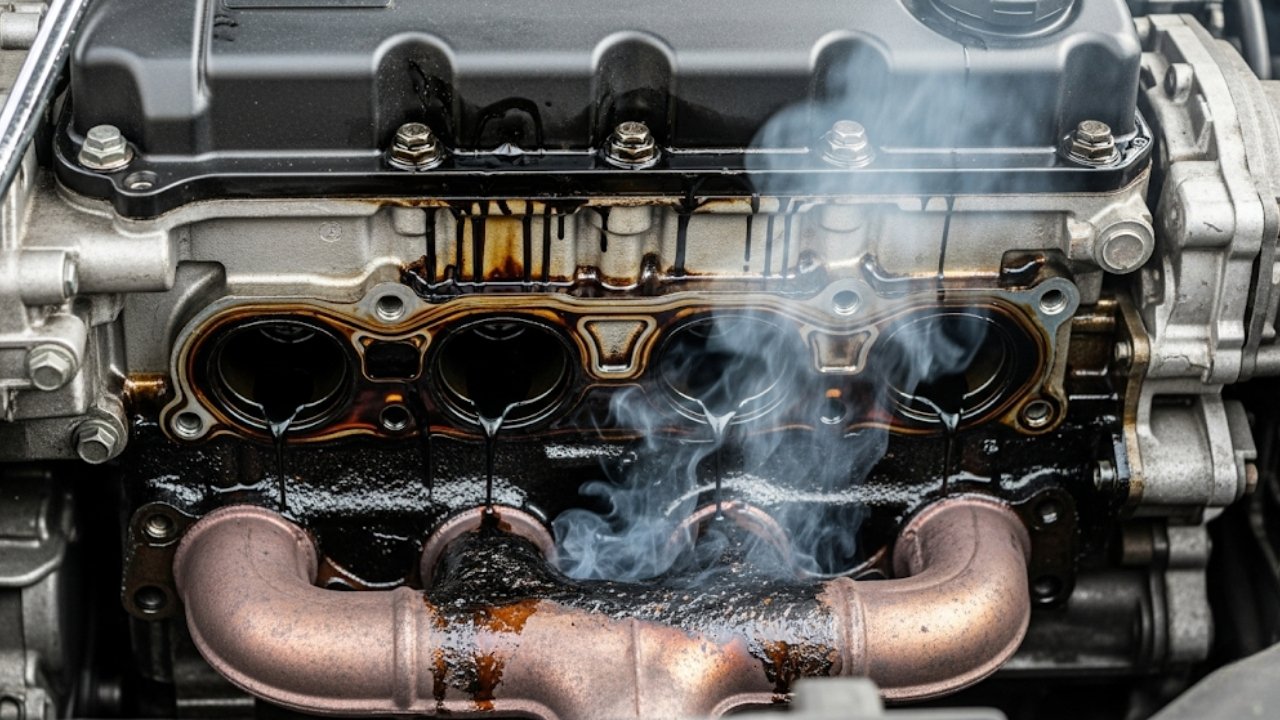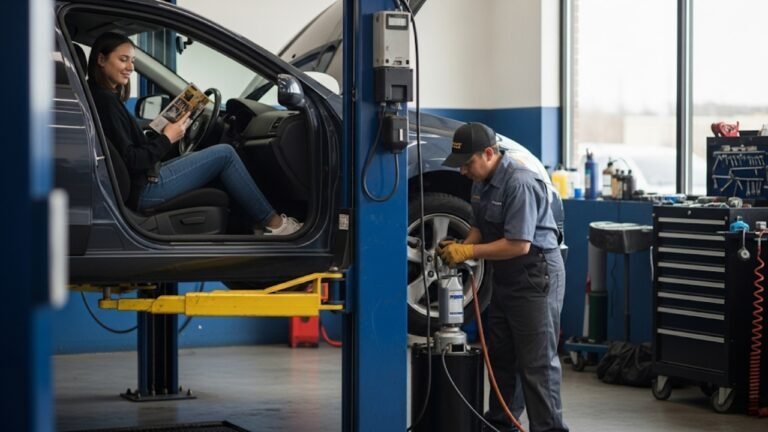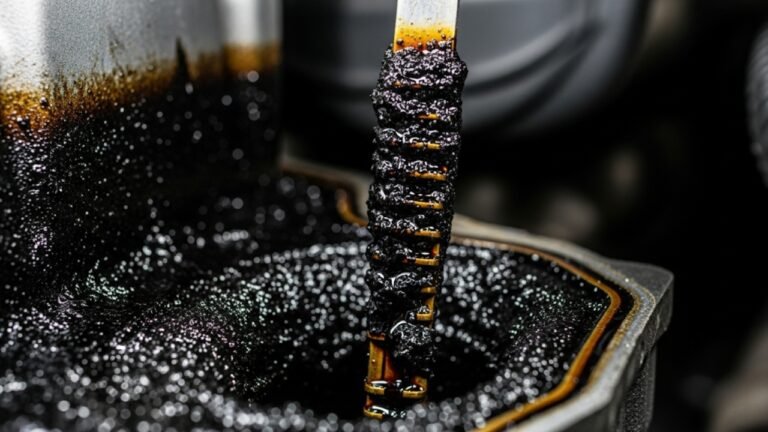Why Does Your Car Smell Like Oil Through the Vents?

Ever turned on your car’s A/C or heater and caught a whiff of something odd—like motor oil or a greasy mechanic’s garage? If so, you’re not alone. That oil smell from car vents is more common than people think, and trust me, it’s not something to ignore. It’s like your car is trying to whisper, “Hey, something’s not right in here.”
I first experienced it one hot summer in Dhaka. I turned on the AC expecting a blast of cold air but got hit with this thick, burnt oil aroma. At first, I thought it was just city pollution sneaking in. But the smell didn’t go away—it grew stronger over days. It clung to my shirt, got in my nose, and eventually made me roll down the windows even with 35°C outside. That was my wake-up call. It wasn’t a one-time odor. It was a symptom.
In this article, we’re going to dive deep into what causes the oil smell from car vents, how to trace the source, fix it, and even prevent it from coming back. We’ll walk through signs, mechanic tips, costs, and what to do if you’re stuck with this irritating (and slightly worrying) smell.
In This Article
- 1 What’s That Smell? Understanding the First Signs
- 2 Common Causes of Oil Smell From Car Vents
- 3 How Your Car’s HVAC System Spreads the Smell
- 4 Is It Dangerous to Breathe in Oil Fumes?
- 5 DIY Fixes vs. Professional Help
- 6 How to Prevent That Oil Smell From Ever Coming Back
- 7 Bullet Points: What to Do When You Smell Oil from Your Car Vents
- 8 Comparison Table: DIY vs Mechanic Repair
- 9 Long-Term Effects of Ignoring the Smell
- 10 FAQs About Oil Smell from Car Vents
- 10.1 ❓1. Why does my car smell like oil when I turn on the heat?
- 10.2 ❓2. Can I still drive my car if I smell oil from the vents?
- 10.3 ❓3. How much does it cost to fix this problem?
- 10.4 ❓4. How can I tell where the smell is coming from?
- 10.5 ❓5. Can old engine oil cause this smell?
- 10.6 ❓6. Is it safe to clean oil leaks myself?
- 10.7 ❓7. How often should I replace my cabin air filter?
- 10.8 ❓8. What if I’ve tried everything but the smell still comes back?
- 11 Final Thoughts: Turn That Smell Into a Story, Not a Disaster
What’s That Smell? Understanding the First Signs

At first, the smell is subtle. It might remind you of old engine grease or burnt toast dipped in petroleum. Many people ignore it, thinking it’ll just go away after a while. But it doesn’t. Instead, it creeps into your car’s fabric, sticks to your clothes, and slowly becomes part of your daily ride.
Here are a few common signs you might notice when that smell starts appearing:
-
The odor gets stronger when the engine is hot
-
It worsens when you turn on the heater or defroster
-
The smell lingers inside the cabin even after you turn the car off
-
You might see smoke coming from the engine bay (especially under the hood)
-
The windshield fogs up oddly—sometimes with an oily film
The most likely reason is that oil or fluid is leaking somewhere, and the ventilation system is sucking in that air. Most HVAC systems in cars aren’t airtight. They draw air from near the engine bay before pushing it inside the cabin. So if there’s a leak, your nose becomes the first sensor.
Common Causes of Oil Smell From Car Vents
Let’s cut to the chase. If your car smells like burnt oil, it probably is burnt oil. Here are the usual suspects:
1. Valve Cover Gasket Leak
This is one of the most common reasons. The valve cover sits on top of the engine and keeps the oil sealed in. Over time, heat breaks down the gasket, and oil seeps out. It drips onto hot engine parts, like the exhaust manifold, which causes that sharp burnt-oil smell that finds its way into your vents.
Symptoms:
-
Oil stains on engine
-
Visible smoke under the hood
-
Smell stronger after long drives
Fix: Replace the gasket. It’s not too expensive but needs some labor.
2. Oil Filter or Cap Not Secured Properly
Sounds simple, but it happens often—especially after an oil change. If the oil cap isn’t screwed back tightly or the filter is loose, oil can leak. That oil hits the engine block and burns, creating that signature scent.
Symptoms:
-
Fresh oil puddle under the car
-
Strong odor during idle or low speeds
Fix: Tighten the cap or replace the oil filter. Quick and cheap fix if caught early.
3. Oil Pan Gasket Failure
The oil pan is under the engine, collecting and storing oil. If the gasket sealing it fails, oil can slowly leak out and spread across hot components.
Symptoms:
-
Oil under the car in the morning
-
Lower oil levels
-
Increasing smell after engine warms up
Fix: Replacing the oil pan gasket might require lifting the engine. Costs more in labor.
4. PCV Valve Malfunction
Your car has a Positive Crankcase Ventilation (PCV) system that helps recycle gases from the engine. If this valve gets clogged or fails, pressure builds up and forces oil through seals and gaskets—leading to leaks.
Symptoms:
-
Rough idle
-
Increase in oil consumption
-
Oil leaks in unusual places
Fix: Replace the PCV valve. It’s affordable and usually easy to access.
How Your Car’s HVAC System Spreads the Smell
Now that we know where the oil is leaking, let’s talk about how it gets inside your car. The HVAC (Heating, Ventilation, Air Conditioning) system is designed to pull in air from outside (or recirculate cabin air) and push it through vents.
If there’s an oil leak near the air intake, that smell gets pulled in directly. Worse, if the leak is inside the cabin (say, from a heater core or nearby components), it’s even harder to escape it.
Here’s a simple table to show where air comes from and how it carries the smell:
| Air Source | Effect on Smell | Common in |
|---|---|---|
| Outside (fresh air mode) | Brings in smells from engine bay if oil is leaking | All vehicles |
| Inside (recirculate) | Traps smell if source is within cabin | Older HVAC systems |
| Heater core zone | Can mix smells from fluid leaks or burnt oil | High-mileage vehicles |
If the smell is stronger when using heat, then the issue could be near or inside the heating system, and that’s a deeper problem. You’re literally heating the oil particles and pushing them into your face.
Is It Dangerous to Breathe in Oil Fumes?
Here’s the scary part—yes, it can be dangerous over time. The oil smell from car vents isn’t just unpleasant, it could impact your health if you’re exposed for too long. Engine oil contains hydrocarbons and chemical additives. When burned, they can release harmful gases.
Long-term exposure to these fumes may cause:
-
Headaches
-
Dizziness
-
Nausea
-
Respiratory irritation
-
Fatigue or brain fog during long drives
I remember a friend who drove his old car with that smell for weeks. He thought he just had a cold or sinus problem. Turned out, it was the constant inhalation of burnt oil fumes. After fixing the leak, he felt better within days. That’s how real it can be.
So if you’re dealing with this, don’t just roll down the windows and tough it out. You’re not only risking engine damage—you’re risking your health.
DIY Fixes vs. Professional Help
Let’s be real—not all of us are car experts. Some fixes are easy, while others need professional hands. If you’re the DIY type, here’s what you can try:
Simple DIY Checks:
-
Open the hood and sniff around (safely, when engine is off and cool)
-
Check oil level and see if it’s dropping
-
Look for oil leaks under the car
-
Tighten the oil cap
-
Replace a dirty cabin air filter
But if you spot visible smoke, engine misfires, or the smell gets worse daily, go see a mechanic. There’s no shame in that. Cars today are complex, and a small leak can quickly turn into a big repair.
How to Prevent That Oil Smell From Ever Coming Back
You’ve fixed the problem, the cabin smells fresh again, and you’re back to enjoying your rides. But let’s be honest—no one wants to deal with the oil smell from car vents twice. It’s like fixing a leaky faucet—you want it done for good.
So, here’s how to stop it from creeping back:
Stay on Top of Oil Changes
Skipping or delaying oil changes doesn’t just harm your engine—it puts pressure on seals and gaskets. Old, thick oil builds up sludge, which can force oil past weak points.
-
Change oil on schedule (follow your owner’s manual)
-
Always check that the oil cap is secure
-
Use quality oil (cheap oil breaks down faster)
Inspect Your Engine Regularly
You don’t have to be a mechanic. Just open the hood once a month and check around:
-
Look for wet spots around the engine block
-
Sniff for early signs of a burnt oil odor
-
Shine a flashlight under the engine for signs of dripping
It takes two minutes and can save you thousands later.
Keep the HVAC System Clean
Yes, your ventilation system can trap odors. Over time, bacteria, moisture, and oil residue build up in the ducts or filters.
-
Replace cabin air filters every 12,000–15,000 km
-
Use HVAC cleaner sprays (foam-based are best)
-
Switch to recirculate mode in heavy traffic or when near engine odors
Warm-Up Without the Heater
If it’s winter, resist the urge to blast the heater as soon as you start the engine. Let the engine run a minute or two before engaging the HVAC. This gives the oil a chance to circulate and settle before fans draw in air from the engine bay.
Bullet Points: What to Do When You Smell Oil from Your Car Vents
Here’s a quick checklist to follow:
-
✅ Turn off the heater or AC when the smell starts
-
✅ Open windows for ventilation
-
✅ Check oil level using dipstick
-
✅ Look under the hood for fresh oil leaks
-
✅ Sniff around the engine area (when cool)
-
✅ Inspect the valve cover gasket and oil cap
-
✅ Replace cabin air filter
-
✅ Visit a mechanic if unsure
Comparison Table: DIY vs Mechanic Repair
| Factor | DIY | Professional Mechanic |
|---|---|---|
| Cost | Low to Moderate | Moderate to High |
| Time | 1–2 hours | Depends on shop |
| Tools Required | Basic hand tools | Full garage setup |
| Risk Level | Low (if you follow steps) | Minimal (professional inspection) |
| Best For | Oil cap, filter, visual inspection | Valve gaskets, PCV, internal leaks |
Long-Term Effects of Ignoring the Smell
Here’s the harsh truth: ignoring the oil smell from car vents can cause more than just a foul ride. Over time, it can lead to:
-
Engine damage from continuous oil leaks
-
Increased fuel consumption
-
Overheating
-
Fire hazards if oil drips onto extremely hot parts
-
Health risks from breathing burnt hydrocarbons
A friend of mine had a small leak from the valve cover. He ignored it until one day, while driving back from Cox’s Bazar, his engine overheated. The repairs? Over 70,000 BDT. A simple gasket change would’ve cost just a fraction of that.
FAQs About Oil Smell from Car Vents
❓1. Why does my car smell like oil when I turn on the heat?
This usually means oil is leaking onto hot engine components, and your HVAC system is pulling in that smell. Most likely culprits include valve cover gasket leaks or a loose oil cap.
❓2. Can I still drive my car if I smell oil from the vents?
You can, but it’s not recommended. The smell often signals a leak or overheating, both of which can cause engine damage. Plus, inhaling burnt oil fumes is harmful.
❓3. How much does it cost to fix this problem?
It depends on the source:
-
Oil cap or filter: Free or <500 BDT
-
Valve cover gasket: Around 3,000–6,000 BDT
-
PCV valve: Around 1,000–2,000 BDT
-
Professional diagnosis: ~1,500–3,000 BDT
❓4. How can I tell where the smell is coming from?
Use your nose and eyes:
-
Smell stronger when engine warms up? It’s likely near the engine.
-
Only smells with the heater on? Check HVAC or heater core.
-
Smell lingers after turning off the car? It’s probably leaking onto the exhaust.
❓5. Can old engine oil cause this smell?
Yes. Old, broken-down oil is more likely to leak, burn, and release stronger odors. Always stick to recommended oil change intervals.
❓6. Is it safe to clean oil leaks myself?
Yes, for surface cleaning. Use degreaser sprays and rags. But be cautious around hot parts or deep internal components—those should be handled by a professional.
❓7. How often should I replace my cabin air filter?
Every 12,000–15,000 kilometers or once a year. Dirty filters can trap odors and even blow them back into the cabin.
❓8. What if I’ve tried everything but the smell still comes back?
You may have an internal oil leak or HVAC contamination. Ask a mechanic to inspect the heater core, intake seals, and ventilation ducts. In rare cases, mold or coolant leaks mimic oil smells.
Final Thoughts: Turn That Smell Into a Story, Not a Disaster
That oil smell from car vents isn’t just a minor nuisance—it’s your car’s way of crying out for help. Think of it like a friend coughing during dinner. You wouldn’t ignore that, right?
So be kind to your car. Treat it well. Listen when it smells odd, drives differently, or behaves strangely. Often, our instincts are right—and that gut feeling that “something’s not okay” is worth listening to.
Whether you’re a student taking your first long drive or a parent hauling kids to school every morning, a fresh, clean car cabin isn’t just luxury—it’s comfort and safety.
Your car talks. Learn to listen.






